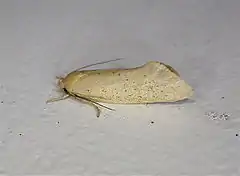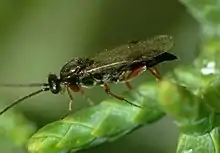Tingena armigerella
Tingena armigerella is a species of moth in the family Oecophoridae. T. armigerella is endemic to New Zealand where it is found in the North Island. The larvae of this species feed on plant litter.
| Tingena armigerella | |
|---|---|
 | |
| Scientific classification | |
| Kingdom: | |
| Phylum: | |
| Class: | |
| Order: | |
| Family: | |
| Genus: | |
| Species: | T. armigerella |
| Binomial name | |
| Tingena armigerella | |
| Synonyms[2] | |
| |
Taxonomy
It was described by Francis Walker in 1864 and named Oecophora armigerella.[3][2] George Hudson discussed and illustrated this species in his 1928 book The butterflies and moths of New Zealand under the name Borkhausenia armigerella.[4] In 1988 John S. Dugdale assigned this species to the genus Tingena.[2] In the same publication Dugdale also synonymised Tingena bifaciella with this species.[2]
Description
This species was described by Walker as follows:
Male. Gilded yellow. Palpi nearly twice longer than the breadth of the head ; second joint much curved ; third shorter than the second. Abdomen, hind wings and under side blackish cinereous. Abdomen extending a little beyond the hind wings. Hind tibiae fringed. Fore wings moderately broad, hardly acute, with many minute blackish points ; costa blackish towards the base. Hind wings blackish. Length of the body 3 lines ; of the wings 10 lines.[3]
Distribution
This species is endemic to New Zealand.[1] It is found throughout the North Island.[5] It is visually very similar to other yellow species of moth but differs from many of these as it has noticeable dark scales on its wings.[5] It has been hypothesised that observations of T. armigerella in the South Island result from misidentification with these visually similar yellow species.[5]
Host and habitat
Larvae feed on plant litter found in Nothofagaceae forest.[6] The larvae are found in between the upper layer of dry loose leaves and the lower layer of compacted moist soil.[7] They live in a shelter they construct with their silk, tying two dead leaves together. The larvae then feed from this shelter.[7]
Enemies

The parasitic wasp Fustiserphus intrudens parasitises the larvae of this species.[7]
References
| Wikimedia Commons has media related to Tingena armigerella. |
- "Tingena armigerella (Walker, 1864)". NZOR.org.nz. Landcare Research New Zealand Ltd. Retrieved 16 October 2016.
- Dugdale, J. S. (1988). "Lepidoptera-annotated catalogue, and keys to family-group taxa" (PDF). Fauna of New Zealand. 14: 1–264 – via Landcare Research New Zealand Ltd.
- Walker, Francis (1864). "Tineites". List of the Specimens of Lepidopterous Insects in the Collection of the British Museum. 29: 563–835 – via Biodiversity Heritage Library.
- Hudson, G. V. (1928). The Butterflies and Moths of New Zealand. Wellington: Ferguson & Osborn Ltd. p. 264. OCLC 25449322.
- Hoare, Robert J. B. (2014). A photographic guide to moths & butterflies of New Zealand. Ball, Olivier. Auckland: New Holland Publishers (NZ) Ltd. p. 33. ISBN 9781869663995. OCLC 891672034.
- "PlantSynz - Invertebrate herbivore biodiversity assessment tool: Database". plant-synz.landcareresearch.co.nz. Retrieved 2018-07-16.
- Early, J. W.; Dugdale, J. S. (January 1994). "Fustiserphus(Hymenoptera: Proctotrupidae) parasitises Lepidoptera in leaf litter in New Zealand". New Zealand Journal of Zoology. 21 (3): 249–252. doi:10.1080/03014223.1994.9517992. ISSN 0301-4223.